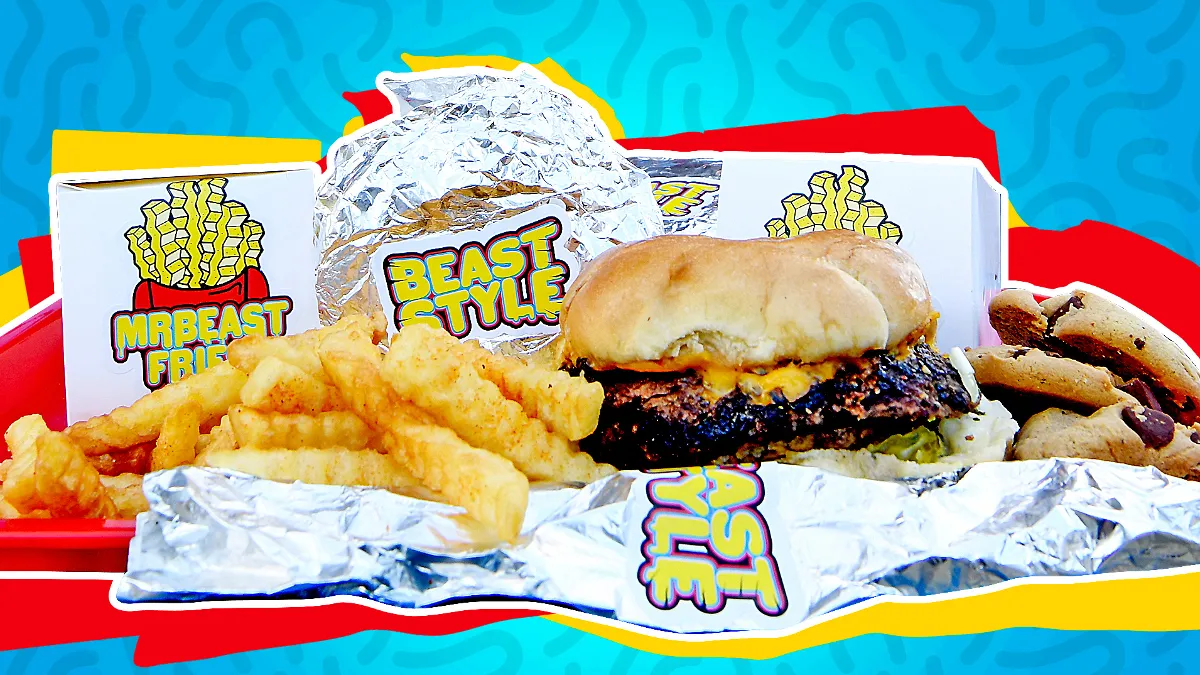James Donaldson, a YouTube star who goes by MrBeast, sued Virtual Dining Concepts on Monday for breach of contract, according to a federal court filing. Donaldson’s company, Beast Investments, also requested the right to end his business partnership with VDC.
Donaldson teamed with VDC in 2020 to create MrBeast Burger, a virtual brand that sells burgers and fries, which quickly became one of VDC’s flagship concepts.
The lawsuit follows a string of complaints Donaldson shared on social media about his partnership with VDC. In June, he tweeted that VDC would not let him shut down the virtual brand, which had garnered a wave of negative consumer reviews.
MrBeast Burger is arguably VDC’s best-known virtual brand concept, and Donaldson’s public frustration over the company’s operations — combined with this lawsuit’s intent to shut down the brand — are major blows.
According to the suit, VDC grew MrBeast Burger too fast “as a way to pitch the virtual restaurant model to other celebrities for its own benefit.” In 2021, the concept opened 1,000 virtual locations, and added another 700 in 2022.
Beast Investments claims this rapid expansion resulted in poor customer experiences and food quality. Diners have shared photos of mostly raw burgers from MrBeast’s virtual brand on social media, per the complaint. Some customers have received their meals with incorrect packaging (a 7-Eleven wrapper, in one example).
VDC claims the lawsuit is “riddled with false statements and inaccuracies and is a thinly-veiled attempt to distratct from Mr. Donaldson’s and Beast Investments’ breaches of the agreements between the parties,” the company wrote in a statement emailed to Restaurant Dive.
“Mr. Donaldson recently attempted to negotiate a new deal to serve his own monetary interests,” VDC wrote. “When VDC refused to accede to his bullying tactics to give up more of the brand to him, he filed this ill-advised and meritless lawsuit seeking to undermine the MrBeast Burger brand and terminate his existing contractual obligations without cause.”
But Beast Investments claims the VDC partnership has hurt Donaldson’s personal brand. More than 50% of MrBeast Burger locations are rated less than two (out of five stars), the lawsuit states. Customers have called the brand’s meals “inedible” and “very upsetting for the high price.”
Diners also are blaming Donaldson for the quality issues rather than VDC, Beast Investments alleges. It shared thousands of complaints circulated online with sentiments such as “HOW COULD YOU DO THIS TO ME JIMMY?”
The suit also alleges while VDC “has made millions of dollars” off of MrBeast Burger, Donaldson “has not received a dime” even though it is owed royalty and distribution payments.
Donaldson claims VDC didn’t make improvements when he pointed out the virtual brand’s issues, and repeatedly posted “his name, image, and brand on social media and elsewhere without first obtaining his written approval and consent.”
These complaints reflect some of the biggest concerns operators have about virtual brands and ghost kitchen partnerships: a lack of control over food quality and presentation. In a Restaurant Dive survey, respondents also shared that consumer confusion over what virtual brands are and how they work is another drawback.
“The boom of virtual brands — with many being misleading — created customer confusion. I think that virtual brands are on their way out,” Kristen Corral wrote, a restaurant owner in Nevada, wrote.
Last month, Red Robin announced it would stop offering MrBeast Burger at its restaurants. The 511-unit chain was a major partner for VDC. The casual chain’s rejection of the brand could hint that sentiment around delivery-only concepts is shifting. In Restaurant Dive’s survey, readers were unanimous that virtual brands wouldn’t increase in prevalence in 2024.
The virtual brand segment has had a rocky few months, with major companies such as Brinker International phasing out one of their virtual concepts and waves of layoffs occurring at Nextbite.














